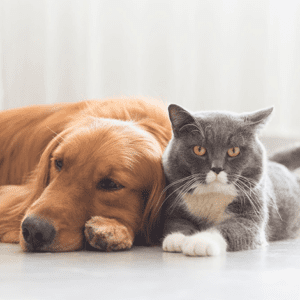You finally decided to bring home a furry friend. You’ve done your research, you’ve figured out what type of pet you want, and you’re ready to sign on the dotted line.
But, have you thought about the ongoing cost(s) associated with getting a pet?
There are two main areas regarding costs to consider when it comes to owning a pet. There are initial costs (adoption fees/breeder fees, first vaccinations, training, etc.) and the general costs over your pet’s lifetime (food, toys, routine vet visits, grooming, etc.).
Of course, there are a dozen other ways pets can be expensive, so it’s a good idea to prepare for several different types of costs.
Adoption fees vs. Breeder fees
One of the first expenses pet owners experience is adoption fees or purchase price. Typically, adoption fees are going to be less expensive than breeder fees.
Most shelters and rescue organizations will provide medical care, vaccinations, and maybe even spaying or neutering animals. If you decide to go the shelter route, it’s essential to ask the volunteers what services your adoption fees include.
Did you know that according to the ASPCA, about 6.5 million companion animals enter U.S. shelters nationwide each year? Of those 6.5 million animals, only about 3.2 million shelter animals are adopted each year. So, if you’re thinking about adoption, you could be saving a life!
It’s also a good idea to find out what the adoption process looks like. It could be different depending on the shelter or rescue organization you choose, but usually, the basics are the same. Once you select your fur-ever friend, you’ll have to fill out paperwork to be approved. The shelter or rescue organization will want to know where you live, whether or not you have other pets, if there are kids in your home and they may even do a home visit before you’re allowed to take your new friend home. Once you pay the fee and your application is approved, then the real fun begins!
The type of breed you’re interested in determines the amount you’ll pay in breeder fees and whether you’re buying from a reputable breeder. If you are buying from a reputable breeder, you’ll likely get a fair, competitive price, and most will have official paperwork on the animal you’re purchasing. Do your homework on the breeder. Make sure you’re buying from someone who isn’t buying animals from unethical institutions.
Medical costs
Vet bills are often the most expensive aspect of owning a pet. If you’re lucky, you’ll have a relatively healthy animal that only needs a vet visit once or twice a year. On the other hand, if your pet does need additional vet care, it can be pretty costly.
The average vet visit can cost a pet owner anywhere from $50 to $400, depending on the nature of the visit. If you’re trekking to the vet once a year, it’s not as challenging to work into your budget. However, if it happens every couple of months, you could find yourself in over your head with vet bills.
Eating right for less
For every question you have about pet ownership, there are a million different answers – and that includes what to feed them! Your new furry friend has to eat, but they don’t have to eat the most expensive food.
When you’re picking out what your pet eats, think about their size (are you feeding them once a day or do they require multiple feedings), how much they eat, and what they like. You might find that your cat loves a particular brand (let’s say it costs less than $20 for a 22-pound bag) or that your dog lives for a specific brand (let’s say that a 50-pound bag is less than $25). Don’t automatically buy the most expensive food. See what works for your animal and your budget.
Toys!
You can’t have an animal without toys. Every cat needs a scratching post, and every dog needs a good rope to play tug-of-war. The great thing about toys? You can spend as much or as little as you want. You might have a cat that would rather play with bottle caps than catnip mice. Before you spend your paycheck buying toys, get a few, and see which ones your furry companion likes. You might be surprised.
Training & grooming costs
Training and grooming are additional costs that you may not have to consider. If you’re getting a cat, you won’t have to worry about training classes or grooming (unless you choose to do so). Cats pretty much take care of themselves – and let’s be real, they train their owners. With a dog, however, training classes might be something you need to consider. Depending on the breed of your dog, grooming might be a necessity, too. Do your research. Look around and find the best deals on grooming and training.
Bringing home a furry friend is a huge commitment. It’s essential to evaluate your current financial situation before deciding to purchase a pet. Let us help. While we don’t offer a pet adoption loan or a pet expense loan, we have affordable personal loans or a low-interest credit card that meets your needs for multiple parts of your life. We’re your credit union. Let us see how we can help.



